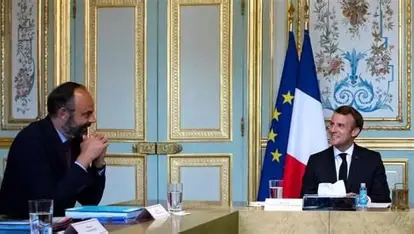Paris, France — France’s political establishment was thrown into turmoil today after Prime Minister Amélie Oudéa-Castéra tendered her resignation to President Emmanuel Macron, just three weeks after taking office, marking one of the shortest premierships in modern French history.
The surprise resignation, confirmed by the Élysée Palace late Monday, comes amid mounting public criticism, internal divisions within the ruling coalition, and fierce opposition from parliament. Oudéa-Castéra’s departure underscores the growing instability within Macron’s administration as it struggles to maintain control over a fragmented political landscape.
In a brief statement released this morning, the former prime minister said she was stepping down “in the interest of stability and transparency,” citing “unresolvable differences” within the government. “I entered this office with the highest sense of duty, but circumstances no longer allow me to serve effectively,” she wrote.
President Macron accepted her resignation and thanked her for her “dedication and courage in challenging circumstances.” The president is expected to appoint a replacement within days, though political insiders suggest the process may take longer than anticipated as Macron faces increasing resistance both from opposition parties and from within his own centrist alliance.
Amélie Oudéa-Castéra, 46, a former sports minister and business executive, was appointed prime minister less than a month ago in what Macron described as an effort to “inject new energy and unity” into his government. However, her tenure was immediately marred by controversy over education reforms, budget disputes, and rising public anger over inflation and immigration policies.
Her resignation follows weeks of protests across several French cities, where thousands took to the streets accusing the government of being “out of touch” with working-class realities. Political commentators say Oudéa-Castéra’s leadership never gained traction amid widespread skepticism about Macron’s agenda and waning public confidence.
“She was brought in to reset Macron’s domestic image,” said political analyst Jean-Luc Mercier. “Instead, her appointment deepened the perception that this government is disconnected from ordinary citizens. Her departure was almost inevitable once the parliamentary opposition united against her.”
For President Macron, the sudden resignation adds another layer of complexity to an already challenging political climate. His second term has been defined by economic strain, protests against pension reforms, and growing discontent with his perceived top-down leadership style. Macron now faces the task of appointing France’s fourth prime minister in less than three years, a situation that analysts describe as “unprecedented instability” for a modern French presidency.
Opposition leaders wasted no time in criticizing the government’s collapse. Marine Le Pen, leader of the far-right National Rally party, called the resignation “a clear sign of Macron’s failure to govern.” Meanwhile, left-wing opposition figure Jean-Luc Mélenchon accused Macron of “burning through prime ministers like disposable pawns.”
In Paris and Marseille, public reaction to the resignation was mixed. Some citizens expressed relief, saying they hoped a new government might bring more transparency and action on cost-of-living issues. Others voiced frustration at what they see as chronic instability at the top levels of government. “I don’t even remember how many prime ministers Macron has had,” said one Parisian shop owner. “Every few months there’s a new one, but nothing changes for us.”
Polls conducted last week by IFOP showed that public approval for Macron’s government had fallen to 28 percent, the lowest level since his re-election in 2022. Analysts warn that the continuing turbulence could strengthen opposition parties ahead of upcoming regional elections and the 2027 presidential race.
The Élysée Palace has not released the names of potential successors, but early speculation points to Interior Minister Gérald Darmanin and Finance Minister Bruno Le Maire as likely candidates. Both are seasoned political figures seen as capable of steadying the government, though neither has confirmed interest in the role. Macron is expected to hold consultations with key coalition leaders before making an official announcement. Government sources say he is seeking a “technocratic but unifying” profile, someone capable of managing the economy and addressing growing social unrest without alienating key allies.
“The president is aware that this appointment could define the remainder of his term,” said a senior official close to Macron. “He cannot afford another misstep.”
This latest resignation adds to a growing perception that Macron’s centrist project is losing its cohesion. Analysts say the president’s ambitious reform agenda has been hindered by constant political turnover, street protests, and a lack of parliamentary majority since 2022. France’s government has been forced to rely on executive decrees to pass controversial measures, further fueling accusations of authoritarianism from both left- and right-wing critics.
The instability has also raised questions about France’s ability to maintain its leadership role within the European Union amid mounting economic and geopolitical challenges. Political observers predict that Macron will attempt to use the crisis as an opportunity to recalibrate his administration. Some insiders suggest that he may appoint a more experienced political heavyweight to restore confidence, while others believe he may turn to a younger, reform-minded figure to project renewal.
Either way, the resignation of Amélie Oudéa-Castéra represents a significant setback for Macron, who faces mounting domestic discontent, European skepticism, and a restless electorate. “The next appointment will be make-or-break for Macron’s presidency,” said analyst Isabelle Fournier of Le Monde Politique. “If he chooses poorly again, his final years in office could be marked by paralysis and fragmentation.”
For now, France’s political scene remains in flux, with citizens and international observers watching closely to see who will step into one of Europe’s most challenging political roles.



